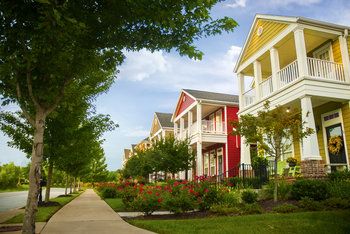

How to research a neighborhood before you buy a house Updated on:
- How to research...
- Homeowners asso...
- Environmental p...
- Sex offenders n...
- Local infrastru...
- Noise pollution

Think you've found the perfect place to live? You might be right. Or maybe not. No matter how much you like a locale at first sight, you should carefully research a neighborhood before buying a house. It's better to identify possible issues before committing rather than discover hidden problems after buying a house.
Here are five things to explore when searching for a neighborhood's dirty secrets.

Any community, whether of detached houses or condominiums, might be governed by a homeowners association (HOA) empowered to collect dues and make rules. HOAs exist to protect the community and property values, explains Frank Rathbun, a spokesman for the Community Associations Institute in Falls Church, Va. "Some people have the mindset that 'my home is my castle,'" Rathbun notes. "If that's your belief, all the way down the line, you might want to think long and hard before moving into a common-interest community."
To find out about an association, contact the board or management company or ask your real estate agent to get the information for you.
Rathbun suggests asking the following questions:
- How much are the HOA assessments and when are they due?
- Are there restrictions on renting?
- What are the architectural guidelines?
- What are the rules with respect to pets, flags, antennas, satellite dishes, clotheslines, fences, patios, and home-based businesses?
Wile HOA guidelines can help preserve property values, they can also contribute to the true cost of home ownership. Find out your responsibilities and restrictions and make sure you're comfortable with them.

Why is it important to identify key environmental problems? Asbestos, leaking underground gasoline storage tanks and unexploded military ordnance are just three of the hazards that lurk in some neighborhoods, says James Budrow, owner of Sacramento Inspection, a home inspection service in Sacramento, Calif.
There can also be serious environmental hazards within a home. To find out about such dangers, you could conduct painstaking personal research on government and private websites, or, Budrow suggests, you can purchase an environmental hazards report based on an automated computerized scan of those databases.
Expect to pay at least $50 for a limited report and $100 for a more comprehensive one. Some inspectors offer a discount if you purchase a report with a home inspection.

If you're concerned about living near someone who's been convicted of a sex crime, check out the Dru Sjodin National Sex Offender Public Website, coordinated by the federal government and local law enforcement agencies. This portal lets you search state databases of registered sex offenders by name, ZIP code or locality.
Be aware that "not all sex offenders have been caught and convicted" and "most sex offenses are committed by family, friends or acquaintances of the victim," according to the California Department of Justice website.

What are the types of infrastructure to be concerned about? Aging roads, bridges, levies, schools and other public structures can be a hazard anywhere in the U.S. While it's not easy to get information about specific risks, a few resources might be helpful.
One is a "report card" published by the American Society of Civil Engineers. These reports "give you a snapshot of a general nature that will give you a sense of the condition of the community you're moving to," says Jim Jennings, spokesperson for the organization.
To find a report, search the organization's website at InfrastructureReportCard.org.
Other resources for this info include government agencies, local newspapers and community websites.

Most cities have ordinances that govern how much noise is permitted and when. But that doesn't mean those neighborhoods are free from noise pollution due to late-night parties, barking dogs, highway traffic, leaf blowers, nightclubs or bars, motorcycles and more. Unless you're willing to risk alienating your neighbors, you might be stuck with any sources of noise that don't specifically violate the law.
To find out about a neighborhood's noises, ask the residents, call the local police department and spend as much time as you can in the area on different days of the week and at different times of the day.
Remember, just because a neighborhood looks nice and quiet on the surface, doesn't mean some dirty secrets aren't lurking below it.